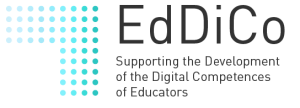The Learning Maturity Model for Digital Education Competence is based on the results obtained by the partnership in the previous stage: The Competence meta-model for Digital education competences. This Learning Maturity Model creates an organisational paradigm for digital education training content as means of structuring the information about the degree of expertise on specific competences for all those teachers and educators that aim at improving their digital competences. For each of the identified competences, educators may not only measure their level of competence achievements in binary terms (achieved/ not achieved), but rather in terms of the degree of expertise achieved under each competence.
The Learning Maturity Model serves as the foundation for EdDiCo’s central outputs: a learning directory with 500 high-quality digital learning opportunities (e.g., MOOCs or OER) which are described in terms of support for attaining digital competences. While the learning opportunities are matched according to specific competence subsets and progression levels and will be suggested to educators through the self-assessment tool.
The process followed by the project to define this Learning Maturity Model for Digital Education competence included the following activities and results:

